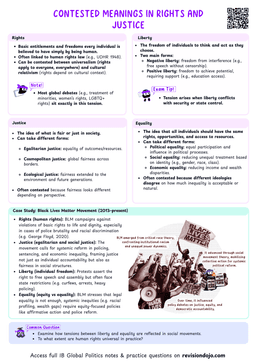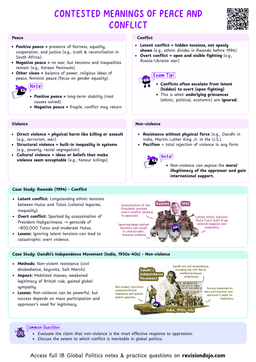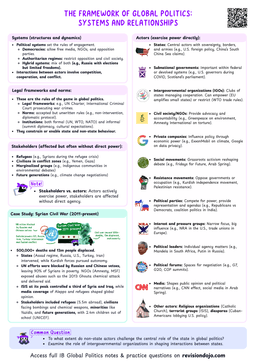Understanding the Challenges of State Sovereignty
Challenges to the Monopoly of the Use of Force
- When violence becomes widespread and uncontrolled within a state, often due to resistance groups, criminal gangs, or terrorism, the state loses its monopoly on the use of force.
- This loss challenges the state's most basic responsibility: to control violence and protect its people.
- If a state cannot control violence, it often also struggles to provide essential services like policing, healthcare, education, and sanitation.
- As a result, citizens may turn to alternative authorities (local, regional, or national) who can meet their daily needs.
- These alternative powers further undermine the state's internal sovereignty.
1. Supranational Organizations
- Supranational organizations are entities that hold authority above individual states, often requiring members to cede some sovereignty for collective decision-making.
- Commonly Perceived Benefits of Joining an IGO (Intergovernmental Organization):
- Economic Benefits:
- States working together as a single market can boost economic efficiency.
- Easier movement of goods, services, and workers benefits all member states.
- Political Benefits:
- Countries acting together are seen as more powerful.
- They gain a stronger voice in global political issues compared to acting alone.
- Security Benefits:
- Member states are viewed as part of a united group.
- This makes them less vulnerable to threats compared to isolated states.
- Economic Benefits:
- European Union (EU): Member states must comply with EU laws and regulations, which can override national legislation.
- United Nations (UN): While the UN respects sovereignty, interventions like peacekeeping missions can challenge state control.
Donald Trump on U.S. Sovereignty and Global Agreements
- In 2017, U.S. President Donald Trump announced that the United States would withdraw from the Paris Climate Agreement.
- He argued that the deal disadvantaged American workers and industries and stated that the U.S. needed to prioritize its own sovereignty and economic interests rather than being bound by international agreements that he believed unfairly restricted American decision-making.
- It's a common misconception that joining supranational organizations always weakens sovereignty.
- In some cases, states gain greater influence on the global stage by pooling their sovereignty.
2. Indigenous Land Claims
- Indigenous peoples are those who have lived on a land for centuries, often long before the arrival of colonists.
- Over time, much of their land was taken without their consent to form new states and borders.
- In recent decades, there has been growing recognition of indigenous peoples' collective rights to their land, territories, and resources.
- Supporting indigenous claims helps not only their communities but also benefits wider society by addressing issues like climate change and biodiversity loss.
- Challenge to State Sovereignty
- Indigenous land claims challenge traditional ideas of sovereignty, which assume the state's authority is always above any other group.
- Today, many states acknowledge that indigenous groups have special claims to land ownership and use.
- This shows that traditional sovereignty is evolving in response to global norms about rights and justice.
- Key Theorist: Frantz Fanon (1925–1961)
- A political philosopher and Marxist from Martinique, Fanon influenced postcolonial thought.
- In The Wretched of the Earth (1961), he emphasized that land is the most essential value for colonized people, bringing not only survival but dignity.
- Australia
- 20% of the land is owned by indigenous people, although it is often in remote, less desirable areas.
- Indonesia
- Indigenous communities regained access to traditional forest lands in 2013.
- New Zealand
- Māori people retained collective and individual rights over forests, fishing grounds, and traditional lands.
- Panama:
- Five regions were officially recognized as indigenous territories.
- HL Extension: Identity
- Identity-based struggles for land rights are a good example of how marginalized groups have challenged global norms and brought about positive change.
Transnational Challenges
Transnational Cultural Groups
- Nationalism is the strong support for a nation, often based on shared language, culture, and history.
- Historically, migrants were expected to abandon their own cultures to "fit in" to the national identity, the so-called "melting pot" idea in the U.S.
- Today, globalization and the internet allow migrants to maintain strong ties to their original cultures while living abroad.
- Transnational cultural groups are people who share a common identity, culture, or values across multiple countries.
- Are Transnational Groups a Threat to State Sovereignty?
- Yes (Realist View):
- Transnational groups might weaken loyalty to the state, prioritizing religious or cultural ties over national interests.
- Example: Violent groups like Islamic State challenged the sovereignty of countries like Iraq, Syria, and Libya.
- No (Liberal View):
- Transnationalism strengthens societies by making them more diverse, vibrant, and globally connected, reducing the risk of conflict.
- Violent groups are seen as rare exceptions, not the norm.
- Yes (Realist View):
Transnational Companies (TNCs)
- TNCs, or multinational corporations, operate across multiple countries and can sometimes be more powerful than some states.
- They pose challenges to traditional ideas of sovereignty, especially when their actions influence domestic governance.
- TNCs can still bring important benefits to host countries by:
- Creating thousands of jobs
- Building infrastructure like roads, schools, and hospitals
- Providing vocational training programs
- Stimulating local businesses through supply chains
- Delivering emergency aid during natural disasters
- Investing in renewable energy and sustainable projects
- Offering employee upskilling programs
- Contributing significant tax revenue to national budgets
The Immense Wealth and Power of TNCs
- TNCs' Power
- In 2021, Apple committed $430 billion to investments across the United States, including infrastructure and job creation, activities that are typically seen as the responsibility of governments.
- This shows how TNCs can sometimes take on state-like roles and challenge traditional ideas of sovereignty.
- TNCs' Wealth:
- Some TNCs are wealthier than many countries.
- For example, Saudi Aramco’s market value (around $2 trillion) surpasses the GDPs of countries like Australia, Spain, and Mexico.
Transnational Technology and Media Companies
- Companies like Meta (Facebook), YouTube, and Google hold massive influence over public opinion and government actions.
- Challenges to sovereignty:
- Spread of misinformation undermines trust and stability within states.
- States have increasingly relied on these companies to monitor and counter misinformation, as they struggle to manage it themselves.
- Potential benefits:
- When used responsibly, technology platforms can mobilize citizens and promote positive societal change.
- When analyzing transnational challenges, consider how they force states to balance domestic priorities with global responsibilities.
Evolving Interpretations of Sovereignty
Sovereignty is not a static concept, it evolves in response to global changes.
Conditional Sovereignty
- Some argue that sovereignty should be conditional on a state's ability to protect its citizens and uphold international norms.
- This perspective supports interventions in cases of human rights abuses but raises ethical and legal questions.
- How do cultural perspectives shape our understanding of sovereignty?
- Consider how Western and non-Western views might differ on issues like humanitarian intervention.
Balancing Sovereignty and Global Cooperation
- States must navigate the tension between maintaining sovereignty and participating in global governance.
- This balance is crucial for addressing transnational challenges while respecting the autonomy of individual states.
- Identify three key challenges to state sovereignty in the 21st century
- Explain how globalization has both strengthened and weakened state sovereignty
- Reflect on the role of supranational organizations in shaping modern sovereignty.


